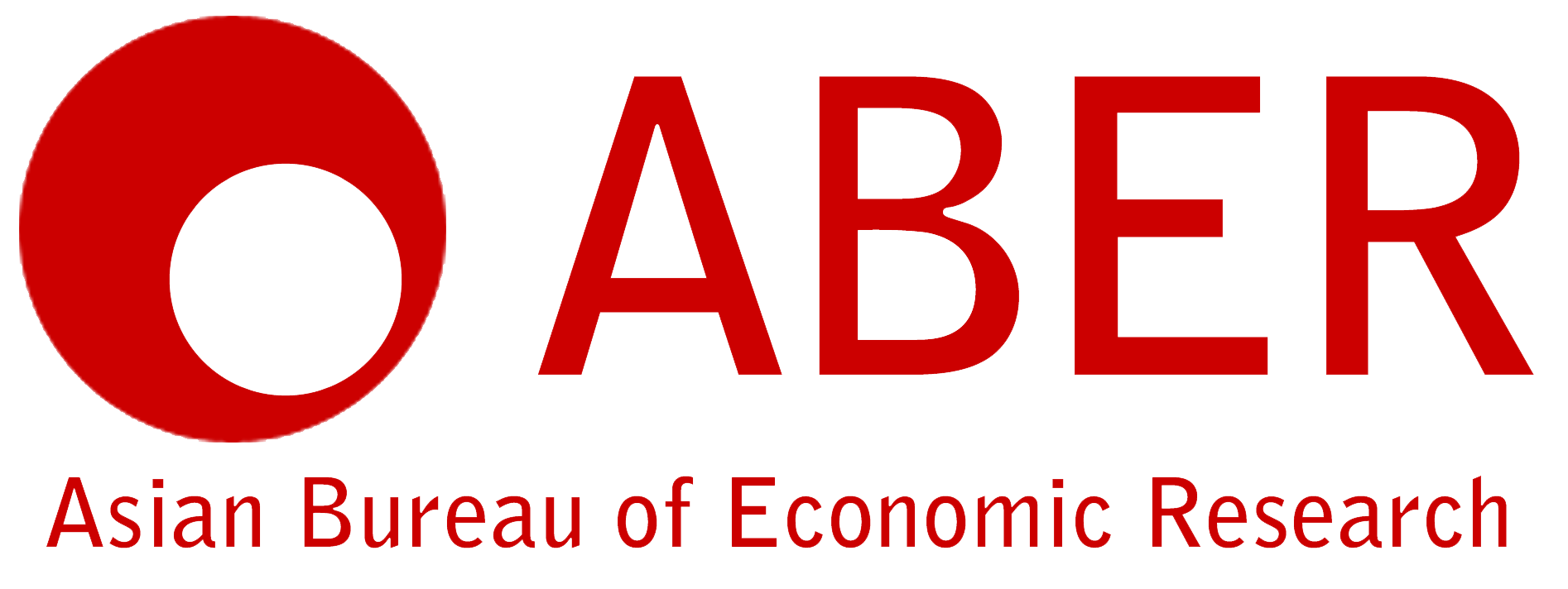ABER members

The East Asian Bureau of Economic Research involves co-operation among key research institutes in Asia, including:
- The Crawford School of Economics and Government, Australian National University, Australia
- The Economic Institute of Cambodia, Cambodia
- The China Center for Economic Research, Peking University, China
- The Department of Economics and Finance, City University of Hong Kong, China
- The Centre for Strategic and International Studies, Indonesia
- The SMERU Research Institute, Indonesia
- The Policy Research Institute, Ministry of Finance, Japan
- The Malaysian Institute for Economic Research, Malaysia
- The Philippines Institute for Development Studies, the Philippines
- The Wee Kim Wee Centre, Singapore Management University, Singapore
- Singapore Centre for Applied and Policy Economics, Singapore
- The Korean Institute for Economic Policy, South Korea
- The Fiscal Policy Research Institute, Ministry of Finance, Thailand
- The Central Institute for Economic Management, Ministry of Planning and Investment, Vietnam
- The Energy Research Institute (ERI), National Development and Reform Commission, China
- The Japan Institute of Energy Economics (IEE), Japan
- The Korea Energy Economics Institute (KEEI), South Korea
- The Institute of Asia-Pacific Studies, China Academy of Social Sciences (CASS), China
- The Institute of World Economics and Politics (IWEP),China Academy of Social Sciences (CASS), China
- The School of Finance, Renmin University of China, China
- Australia-Japan Research Centre, Australian National University, Australia
- Asia Development Bank Institute, Tokyo, Japan
- Dhurakij Pundit Universtiy Research Center, Bangkok, Thailand
- Bangladesh Institute of Development Studies (BIDS), Bangladesh
- The Centre for Economic and Social Studies (CESS), India
- The Centre for Policy Development (CPD), Bangladesh
- The Economics Department of the University of Dhaka, Bangladesh
- Indian Council for Research on International Economic Relations (ICRIER), India
- The Indira Gandhi Institute of Development Research (IGIDR), India
- The Institute for Integrated Development Studies (IIDS), Nepal
- Institute of Business Administration (IBA), Pakistan
- The Institute of Economic Growth (IEG), India
- The Institute of Policy Studies (IPS), Sri Lanka
- Lahore University of Management Sciences (LUMS), Pakistan
- Madras School of Economics (MSE), India
- MARGA Institute (MARGA), Sri Lanka
- The National Council for Applied Economic Research (NCAER), India
- The National Institute of Public Finance and Policy (NIPFP), India
- The Pakistan Institute of Development Economics (PIDE), Pakistan
- Research and Information System for Developing Countries (RIS), India
These leading economic research institutes in South Asia now join the EABER network which includes the following institutes in East Asia:
- China Centre for Economic Research, China
- The Central Institute for Economic Planning, Vietnam
- The Centre for Strategic and International Studies, Indonesia
- City University Hong Kong, Hong Kong
- The Energy Research Institute, China
- Economic Institute of Cambodia, Cambodia
- The Fiscal Policy Research Institute, Ministry of Finance, Thailand
- The Institute of Asia-Pacific Studies, China
- The Japan Institute of Energy Economics, Japan
- The Korea Energy Economics Institute, South Korea
- The Korea Institute for Economic Policy, South Korea
- The Malaysian Institute of Economic Research, Malaysia
- The Philippines Institute for Development Studies, Philippines
- The Policy Research Institute, Japan
- The Renmin University School of Finance, China
- The SMERU Research Institute, Indonesia
- Singapore Centre for Applied and Policy Economics, Singapore
- Singapore Management University, Singapore
- The Thai Development Research Institute, Thailand
- The Australian National University (Crawford School of Economics and Government), Australia
These institutes link to the SABER and EABER websites, publish commentary and analysis of developments in the Asian economy, engage in collaborative research projects and through these activities project Asian research on the Asian economies globally.
